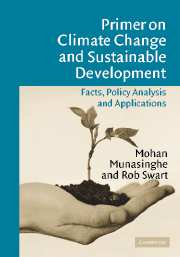Book contents
- Frontmatter
- Contents
- Foreword
- Preface
- 1 Climate change: scientific background and introduction
- 2 Future scenarios of development and climate change
- 3 Framework for making development more sustainable (MDMS): concepts and analytical tools
- 4 Interactions between climate and development
- 5 Adaptation to climate change: concepts, and linkages with sustainable development
- 6 Vulnerability, impacts, and adaptation by sectors and systems
- 7 Vulnerability, impacts, and adapation by geographic region
- 8 Mitigating climate change: concepts and linkages with sustainable development
- 9 Mitigation measures: technologies, practices, barriers, and policy instruments
- 10 Assessment of mitigation costs and benefits
- 11 Climate change and sustainable development: a synthesis
- Index
- References
4 - Interactions between climate and development
Published online by Cambridge University Press: 25 December 2009
- Frontmatter
- Contents
- Foreword
- Preface
- 1 Climate change: scientific background and introduction
- 2 Future scenarios of development and climate change
- 3 Framework for making development more sustainable (MDMS): concepts and analytical tools
- 4 Interactions between climate and development
- 5 Adaptation to climate change: concepts, and linkages with sustainable development
- 6 Vulnerability, impacts, and adaptation by sectors and systems
- 7 Vulnerability, impacts, and adapation by geographic region
- 8 Mitigating climate change: concepts and linkages with sustainable development
- 9 Mitigation measures: technologies, practices, barriers, and policy instruments
- 10 Assessment of mitigation costs and benefits
- 11 Climate change and sustainable development: a synthesis
- Index
- References
Summary
In this chapter, we take the first steps towards applying some of the basic elements introduced in the previous chapter, in order to make development more sustainable in the context of climate change. In Chapter 3, we outlined the importance of two inter-related issues that need to be investigated, using the sustainomics framework: (a) the implications of climate change and climate change responses (including adaptation and mitigation) for sustainable development, and (b) the implications of development strategies and policies in both developing and developed countries, for climate change and climate change response options, and vulnerability to climate change impacts, including associated synergies and trade-offs.
Circular relationship between climate change and sustainable development
The full cycle of cause and effect between climate change and sustainable development is summarized in Figure 4.1, in which we outline an integrated assessment modelling framework (IPCC 2001b). Each socioeconomic development path in the bottom right-hand quadrant of the figure – driven by the forces of population, economy, technology, and governance – gives rise to different levels of greenhouse gas emissions. These emissions accumulate in the atmosphere, increasing the greenhouse gas concentrations and disturbing the natural balance between incident solar radiation and energy re-radiated from the Earth, as indicated in the Climate Domain box on the left-hand side. Such changes give rise to the enhanced greenhouse effect that increases radiative forcing of the climate system.
- Type
- Chapter
- Information
- Primer on Climate Change and Sustainable DevelopmentFacts, Policy Analysis, and Applications, pp. 143 - 171Publisher: Cambridge University PressPrint publication year: 2005



